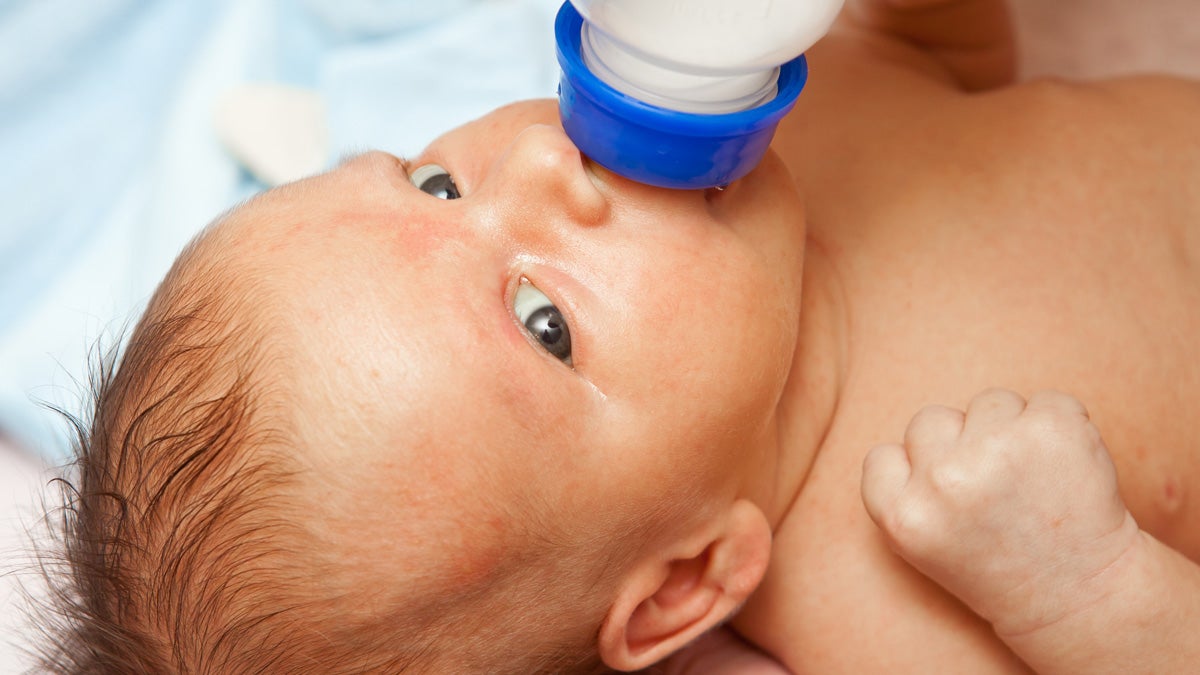Pressuring new mothers to breastfeed doesn’t always consider their needs

(Bottle feeding image courtesy of Shutterstock.com)
Perhaps breastfeeding vs. bottle feeding should also be added to the list of topics to avoid in polite company. There is a tremendous amount of pressure for women to breastfeed, and I know because I’ve endured it.
It is generally recommended to avoid discussing religion and politics because people tend to have strong feelings about these subjects. Those who brave such topics are seen to do so with the intention of being confrontational. Perhaps breastfeeding vs. bottle feeding should also be added to the list. There is a tremendous amount of pressure for women to breastfeed, and I know because I’ve endured it.
Before my first child was born, I already knew it was a touchy subject. Harshly worded articles came down pretty strongly on one side of the camp. Birthing board forums raged in the comment sections. A first-time expectant mother, I of course read everything. Forget asking your own mother for advice, my generation loves to consume information via the Internet.
By the time my first child actually was born I had decided to breastfeed. All of the articles I read suggested that formula was reserved for a last-ditch effort by mothers who had exhausted themselves first trying to make breastfeeding work. I had been led to believe that anyone who sought out formula immediately upon birth was lazy, perhaps even unfit.
Friendly advice is one thing …
My firstborn was an emergency cesarean section. While he took to breastfeeding without issue, I was having a difficult recovery. The second night when a kind older nurse suggested that I send him to the nursery for the night and let him have a bottle so I could rest, I — a mother for a full 30 hours at that point — was shocked. I informed her that I wanted breastfeeding to work. I’ll never forget how she looked, as if she had had this conversation too many times, when she told me “One bottle every now and then won’t hurt him.” What did she know? Her advice contradicted the scores of hours I had spent reading on the subject, and so he stayed.
However, 17 months later I was back in the hospital with son number two. By this time, I had learned two things: There should be no shame in bottles; and there is a very good reason mothers with C-section births are kept in the hospital for days. Recovering from a major abdominal surgery is serious.
The second night, I asked for the baby to be taken to the nursery and given a bottle for his next feeding. I was planning on taking some good advice I had rejected previously and sleep while the getting was good.
… harassment is something else.
Imagine my shock the next morning when the lactation consultant waltzed into my room and demanded to know why my child was given a bottle. I told her I needed to rest, but she didn’t approve. She continued to berate and belittle me for those few ounces. She cited statistics on the harm and damage I had inflicted on my son. She sounded akin to the frightening online forums I once perused. I told her she need not check on me again; she dumped a pile of pamphlets and left.
With baby number three there was no lactation consultant checking in with me. Perhaps this was because of my previous children, or maybe because I had dismissed the consultant in the past. Regardless, breastfeeding was still stressed. While walking extremely slowly around the halls I saw a poster hanging up. It read “It’s his baby; his choice too” and depicted a father standing next to a mother breastfeeding. I shuffled away thinking “With all the other demanding forces, now fathers are encouraged to harass mothers as well?”
New mothers endure an incredible amount of pressure on this subject, from strangers chattering on the Internet, to know-it-all lactation consultants making bedside visits — and now even fathers. The “ban the bag” movement, consisting of no longer providing diaper bags filled with formula and coupons to new moms adopted by Philadelphia-area hospitals, while more subtle than these other pressures, is still pressure.
I respect that these institutions do not want to implement a cleverly designed marketing trick. However, six area hospitals made a pact with each other to stop handing out the bags so as to not lose business should one still provided them. I personally find it insulting that doctors and boards believe expectant mothers will choose their providers based on freebies. I choose to believe that patients decide where to deliver based on the quality of the medical care that they and their babies will receive. I hope that, moving forward, hospitals and society will stop blasting their own agenda and learn to be more sensitive to the needs and wants of new mothers.
WHYY is your source for fact-based, in-depth journalism and information. As a nonprofit organization, we rely on financial support from readers like you. Please give today.

